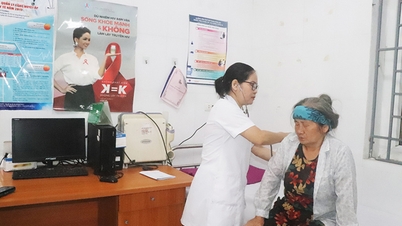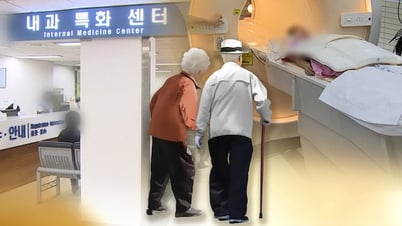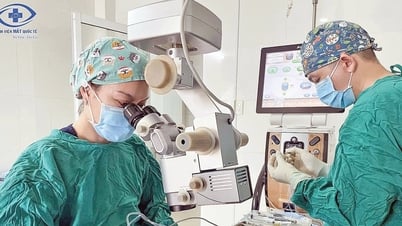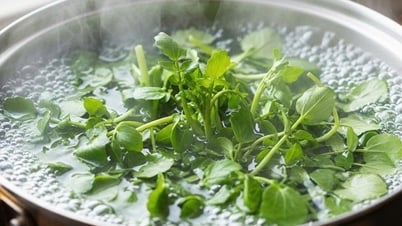Building a reasonable diet, preparing food appropriately, drinking enough water, exercising... helps reduce digestive disorders in the elderly.
Digestive disorders are conditions in which the digestive tract shows signs of structural or functional abnormalities, with frequent contractions of the sphincter muscles, causing abdominal pain, indigestion, nausea, and changes in bowel habits. The disease can occur at many ages, including the elderly.
Dr. Vu Truong Khanh (Head of the Department of Gastroenterology, Tam Anh General Hospital , Hanoi ) said that there are many reasons why the elderly are susceptible to digestive disorders. Weak teeth prevent food from being crushed, the function of the digestive system is weakened, making it difficult for food to move, leading to choking and difficulty swallowing. Poor elasticity of the stomach reduces the capacity and speed of food excretion. Reduced stomach and intestinal motility slows down the mixing and digestion of food. Therefore, the elderly often suffer from constipation. In addition, the function of secreting digestive juices such as saliva, gastric juice, intestines, etc. decreases in both quantity and quality, affecting the digestive process.
Decreased levels of lactose-digesting enzymes cause some older adults to have digestive problems when consuming dairy products. Some types of bacteria in the digestive system increase in number with age, leading to abdominal pain and bloating. Older adults often have many chronic diseases that can cause digestive problems such as diabetes, insomnia, and side effects of medications used to treat chronic diseases.
Below are ways to improve digestive disorders in the elderly as suggested by Dr. Khanh.
Build a reasonable diet
Elderly people should use vegetable oil instead of animal fat; increase vegetables, fruits, fiber. Dark green leafy vegetables such as kale, spinach, broccoli... are rich in antioxidants, folate, good for cardiovascular health, support cancer prevention, cognitive decline; contain a lot of vitamin K to help blood clot and contribute to preventing osteoporosis. Some fruits such as papaya, banana, orange are easy to chew and swallow, and provide a variety of vitamins and electrolytes.
To reduce the burden on the digestive system, the elderly should limit red meat consumption such as buffalo, beef, goat, lamb; eat more fish than meat about 3 times a week. Do not eat more than 3 eggs a week to avoid excess cholesterol, which puts a burden on the liver and can easily lead to digestive disorders. To ensure enough protein for the body, the elderly can increase the use of vegetable protein from soy milk, tofu, etc.
The diet should reduce salt seasoning, avoid salty foods; it is best to limit salty foods such as dried fish and meat, fish sauce, salty braised foods... Fried foods with a lot of oil are difficult to digest, can aggravate digestive disorders, so they should be replaced with boiled and steamed dishes. Prioritize foods containing a lot of carbohydrates such as rice, pasta, bread, whole grains, which both help thicken stools and provide energy for the body.

Elderly people should eat lots of fruits and vegetables to prevent constipation. Photo: Freepik
Prepare the right food
Food for the elderly must be prepared hygienically and cooked to the right degree. The elderly should avoid raw food, salads, and pickles because they can easily cause bloating, flatulence, and a high risk of bacterial and parasitic infections. Vegetables and fruits should be washed many times and peeled before eating. Some foods such as soups, broths, and porridges with little spices and fat are easy to digest and provide the body with necessary fluids and electrolytes.
Change eating habits
Elderly people should not eat too much at one meal or skip meals when they do not want to eat. Meals should be divided into small, moderate amounts, about 2-3 hours apart. When eating, you should concentrate, limit talking, watching TV, avoid distractions that can easily cause choking. Eating slowly and chewing thoroughly helps limit swallowing air, avoid sudden distension of the digestive tract, reduce bloating and flatulence. You should not lie down immediately after eating, but should exercise gently to make food easier to digest. Dinner should be about 3 hours before bedtime.
Drink enough water
Dr. Khanh said that the elderly have a reduced sense of thirst, sometimes the body is dehydrated but still does not feel thirsty. Therefore, this group of people needs to replenish water by drinking about 70-100 ml every 2 hours, do not wait until thirsty to drink. Prioritize using filtered water, thin rice water, ginger water, fresh coconut water; avoid using alcohol, tobacco, coffee, carbonated water or soft drinks containing a lot of sugar. Because these products all cause digestive disorders, making dehydration worse, prolonging the uncomfortable hangover symptoms.
Using warm water helps increase intestinal motility, facilitate defecation, and improve constipation. When receiving enough water, the digestive system can also absorb maximum nutrients, preventing malnutrition. Do not drink too much water to avoid burdening the kidneys. To avoid waking up in the middle of the night, do not drink too much water in the evening.
Do exercise
Exercising and practicing gentle qigong, suitable for health, for about 30 minutes a day helps stimulate intestinal motility, regulate waste through the colon, and improve the digestive system.
Regular health check-up
According to Dr. Khanh, the elderly should have regular health check-ups to have a direction to control chronic diseases well. In addition, digestive disorders can be a manifestation of a mild, transient digestive disease, but can also be a sign of a serious digestive disease that needs to be detected and treated promptly. Therefore, when the elderly have signs of digestive disorders such as loss of appetite, bloating, indigestion, diarrhea or constipation, nausea, etc. that last for a long time, family members need to take them to a medical facility immediately for examination and treatment.
Trinh Mai
Source link







![[Photo] General Secretary To Lam chairs the 14th Central Military Commission Conference](https://vphoto.vietnam.vn/thumb/1200x675/vietnam/resource/IMAGE/2025/6/20/a9d25fc6dd664fb9a3757502f32e5db0)























































![[Maritime News] Wan Hai Lines invests $150 million to buy 48,000 containers](https://vphoto.vietnam.vn/thumb/402x226/vietnam/resource/IMAGE/2025/6/20/c945a62aff624b4bb5c25e67e9bcc1cb)














































Comment (0)